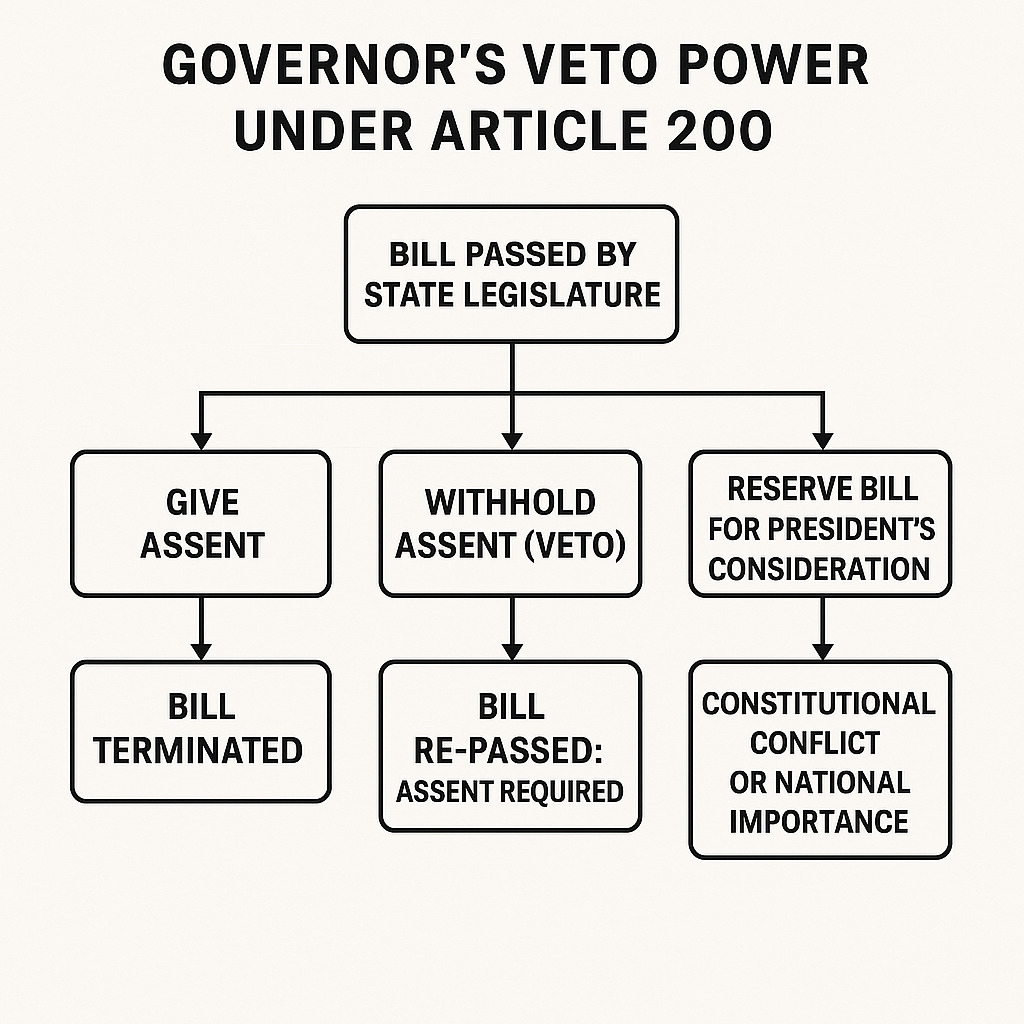View News
Article-200-The-Veto-Power-of-the-Governor-and-Its-Multifaceted-Implications

Article 200: The Veto Power of the Governor and Its Multifaceted Implications
~Sura Anjana Srimayi
Introduction
Article 200 of the Indian Constitution empowers the Governor of a State to either assent to, withhold, or reserve for Presidential consideration any Bill passed by the State Legislature. While this provision appears procedural, its practical implications are far-reaching, influencing legal outcomes, political dynamics, and economic activities within the state. A nuanced understanding of the Governor's veto power is thus essential for grasping the balance of power in India’s federal framework.
Scope of the Governor’s Powers under Article 200
Under Article 200, once a Bill is passed by the State Legislature, the Governor has four options:
-
Give Assent: The Bill becomes law.
-
Withhold Assent (Veto): The Bill is effectively terminated and does not become law.
-
Return the Bill with Recommendations: This constitutes a suspensive veto. If the Legislature re-passes the Bill with or without amendments, the Governor is constitutionally bound to assent.
-
Reserve the Bill for the President’s Consideration: Applicable in cases of potential constitutional conflict or matters of national importance, invoking Article 201.
Notably, the Governor's veto is not absolute—especially in light of the proviso requiring assent after re-passage by the legislature.
Legal Implications of Withholding Assent
-
Non-Enactment of Law: The Bill ceases to have legal force.
-
Legislative Stalemate: Creates tension between the elected Legislature and the Governor, especially if the Bill has widespread legislative support.
-
Constitutional Scrutiny: The Governor’s decision can be challenged in court on grounds of arbitrariness, mala fide intent, or exceeding constitutional mandate.
-
Fundamental Rights Safeguard: If a Bill infringes on fundamental rights, the Governor may reserve it for Presidential assent, though this must be exercised judiciously.
-
Federal Tensions: Overuse or misuse of this power may be seen as Union interference in State autonomy.
-
Status Quo Maintenance: Withholding assent to reformative Bills maintains existing laws, potentially freezing legal and administrative progress.
-
Judicial Oversight: The Supreme Court has underscored the necessity of time-bound decisions by Governors, affirming that indefinite delays in assent are not constitutionally permissible.
Economic Consequences of the Veto Power
-
Delay in Development Projects: Infrastructure and welfare initiatives may stall, escalating costs and slowing economic growth.
-
Investor Uncertainty: Sudden rejection of economic reform Bills discourages both domestic and foreign investment.
-
Policy Paralysis: Repeated or unexplained vetoes erode governance efficiency and policy execution.
-
Sectoral Impact: Vetoed Bills aimed at particular sectors (e.g., agriculture, renewable energy) may hinder innovation and employment generation.
-
Fiscal Disruption: Bills concerning taxation or budgeting, if withheld, disrupt fiscal planning and financial stability.
-
Reputational Damage: States perceived as politically volatile or administratively unreliable risk losing investor confidence.
-
Opportunity Costs: Legislative resources expended in drafting and debating Bills go wasted if they are ultimately rejected.
Key Constitutional Considerations
-
Suspensive Nature of the Veto: The proviso to Article 200 restricts the Governor’s power to a temporary obstruction, not a permanent barrier.
-
Reservation for the President (Article 201): Offers a resolution mechanism in cases of constitutional conflict, but also adds to procedural delays.
-
Judicial Guardrails: Courts have emphasized that gubernatorial discretion must be exercised with transparency, accountability, and within a reasonable timeframe.
-
Political Undertones: The use of veto powers often reflects centre-state political equations, sometimes leading to allegations of partisanship.
-
Comparative Analysis: Much like the President's veto under Article 111, the Governor’s veto can be overridden by legislative re-approval, illustrating the checks within India’s democratic structure.
Conclusion
Article 200 places a significant responsibility on the Governor—balancing constitutional duty with political neutrality. While the veto power is designed to serve as a check within legislative functioning, its misuse or overreach can lead to legal disputes, economic disruption, and erosion of democratic norms. Timely and reasoned decision-making by the Governor, coupled with judicial vigilance and legislative resilience, ensures that this provision supports cooperative federalism and inclusive state development.
"Unlock the Potential of Legal Expertise with LegalMantra.net - Your Trusted Legal Consultancy Partner”
Disclaimer: Every effort has been made to avoid errors or omissions in this material in spite of this, errors may creep in. Any mistake, error or discrepancy noted may be brought to our notice which shall be taken care of in the next edition In no event the author shall be liable for any direct indirect, special or incidental damage resulting from or arising out of or in connection with the use of this information Many sources have been considered including Newspapers, Journals, Bare Acts, Case Materials , Charted Secretary, Research Papers etc.

